Good times or bad, the steps of Hazrat Khalifatul Masih IIra were always seeking the heights of achievements. Accordingly, he once said in a couplet:
مجھ کو اِک آتش فشاں پُروَلولہ دل کی تلاش
“I search for a heart throbbing with passion; Like an active volcano ready to erupt”
Asif M Basit, London
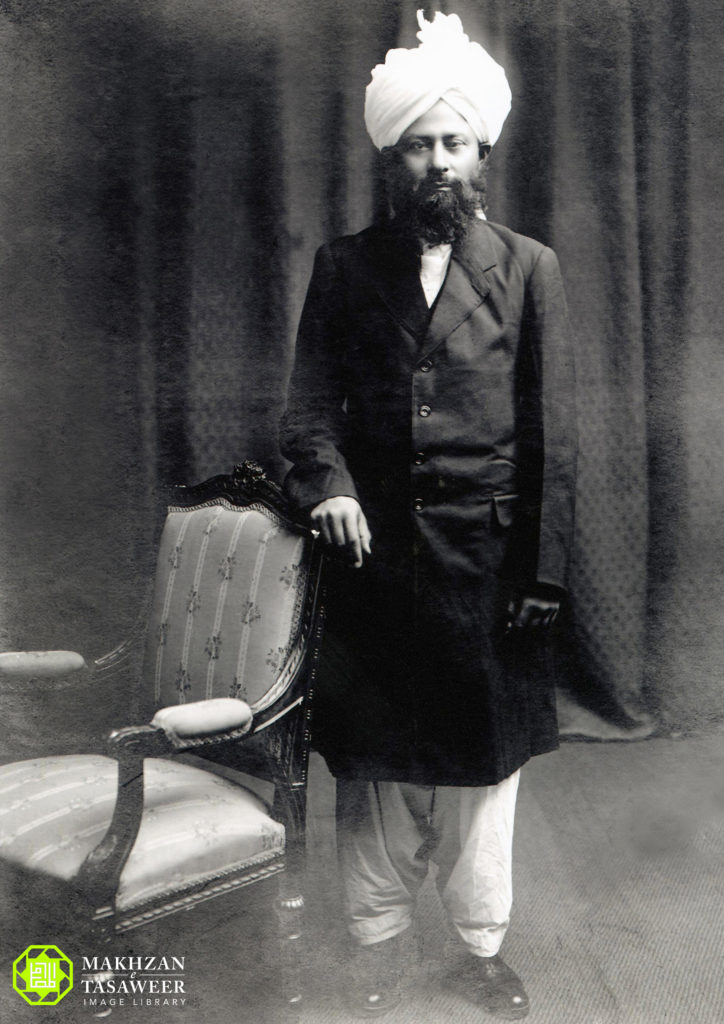
Two very significant events took place on 12 January 1889. Both events hold important place in religious history and both events are associated with the prophecies of the Holy Prophet of Islam, Hazrat Muhammad, peace and blessings of Allah be upon him.
The first prophecy was that in the final era, the Muslims would resemble the Jews and would divide into 73 sects of which only one sect would be worthy of being called “Al-Jamaat”, who would follow the true teachings of Islam. This Jamaat would belong to the Messiah and Mahdi.
The second prophecy was that the Messiah, who would come in the latter days, would marry and he would be blessed with progeny.
It was 12 January 1889, when Hazrat Mirza Ghulam Ahmadas, from a small, unknown town of Qadian published a pamphlet that declared that by the command of God Almighty, he would take the pledge of fealty and whoever would take that pledge, would be considered to be a member of his “Jamaat”. But this pledge was not an ordinary pledge because it had ten conditions attached to it, which were compulsorily to be fulfilled to remain faithful to the pledge. All these conditions were the essence of Islamic teachings. These conditions were a summary of all injunctions that must be followed and a collection of all prohibitions that were to be avoided.
Hazrat Mirza Ghulam Ahmadas included another announcement at the end of the above announcement and that was that he was blessed by the birth of a son on that very date and that he was named Bashiruddin Mahmud Ahmad. Thus took place the twin birth of Hazrat Mirza Bashiruddin Mahmud Ahmadra and the Ahmadiyya Jamaat.
The claim of being the Messiah by Hazrat Mirza Ghulam Ahmad Qadianias made it palpably clear that these were the two prophecies of Hazrat Muhammadsa, the Holy Prophet of Islam, that were fulfilled simultaneously.
This child continued to grow under the watchful eye of his august father. From infancy to childhood, he progressed to a youth and showed all the talent on the way. It was in his childhood, when he was in the lap of his august father, that he pointed to a twinkling star in the sky and said, “Father! I want to go to the stars.” It may be innocent, but it was also a very ambitious desire.
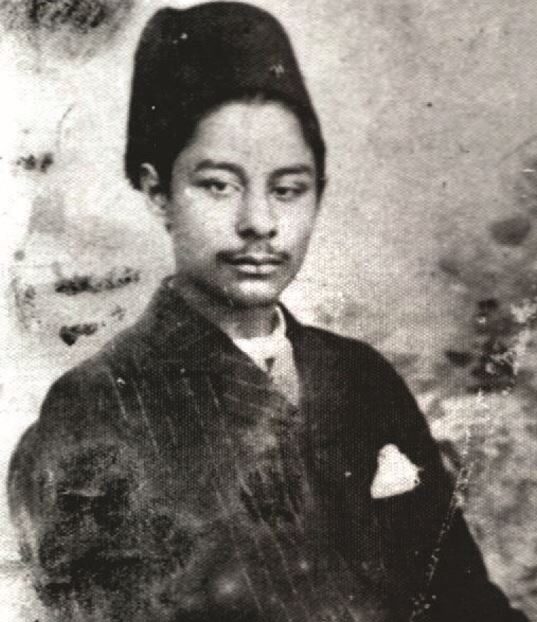
From his very childhood, he suffered from the redness and swelling of the eyes and his childhood was seemingly wasted with unsuccessful efforts of having regular education. Some teachers went to see his august father and in a manner of complaint, said that the boy was falling behind other students. The Promised Messiahas said, “Let me test him”. He asked the child to write something, which he did correctly. He showed his satisfaction and said that he could write well.
In fact, Hazrat Ahmadas knew that this child did not need the knowledge of usual subjects and that his syllabus of covert and overt knowledge had been arranged in the Heavens. However, in gaining the knowledge of the Holy Quran and ahadith, the child never showed any contraction, nor did the Promised Messiahas leave any deficiency. The child had great love in his heart for these two subjects from the very beginning. The child was growing very fast and so was the twin born Jamaat going through different stages of progress. The child was always worried about this twin.
The welfare of the members of the Jamaat was always dear to his heart from the very young days. His passion for prayers increased and God Almighty showed him the way. He gathered an assembly of people with the name of “Tash-heez-ul-Azhan” and started a journal of that name as well. In the early publications, the articles of this young man on different subjects are so mature that no one can say that those were written by a 16 or 17-year-old boy.
After reading those essays, no one can say that that was written by a young man who did not have a regular education. Not even a scholar could write so lucidly.
In 1908, the trying moment came when the Promised Messiahas passed away. This young man became an orphan. In this very stage of helplessness, he stood next to his great father, who had only just passed away, and took an oath that even if the whole world forsook him, he would continue the great work of his great father and would spread the message to all the corners of the Earth.
Only six years had passed this event, when the historical year of 1914 arrived – the year in which the First World War started and all the nations of the world were tormented with fear. That very year, this callow looking youth was made to take the helm of the Jamaat and God Almighty made him take the great seat of his great father. Thus, two prophecies came to be fulfilled – two prophecies of the Promised Messiahas.
One prophecy was about the Great World War and the other was the great son taking over his mission to spread the message of Islam to the corners of the world. On the one hand, the World War had shaken the whole world from its foundation and on the other, this young man was challenging the world:
محمود کر کے چھوڑیں گے ہم حق کو آشکار
روئے زمیں کو خواہ ہلانا پڑے ہمیں
“We will manifest the message of truth to the world, even if we have to ruffle and startle the Earth.”
Thus, the year 1914 – the year of initiation of the Khilafat of Hazrat Mahmudra – proved to be the year that shook the world. The twin prophecies of the World War and the Khilafat of Hazrat Mahmudra occurred simultaneously. Thus began the Khilafat of the Promised Reformer [Musleh-e-Maud] in tumultuous and violent times.
Neither the violence receded, nor did the restlessness of the people abate, and thus the desire of Hazrat Musleh-e-Maudra became an impassioned call:
مجھ کو اِک آتش فشاں پُروَلولہ دل کی تلاش
“I search for a heart throbbing with passion; like an active volcano ready to erupt.”
If the man, who immediately after taking the seat of Khilafat had to face the learned and prosperous of the Jamaat decamp with the treasury, who had only a few coins to run a Jamaat of hundreds of thousands and whose educated class falls victim to its own arrogance, still remained steadfast to uphold the promise he made to his dying father with God as his Witness, then that steadfastness was surely because of a heart of volcanic disposition.
Thus, why would this great Musleh not feel incensed when someone suggested delaying an educational institution because of shortage of money. How could the one who had the courage to take over a Jamaat of hundreds of thousands without a penny in the treasury and who had experienced God’s blessings being showered on the Jamaat have accepted such a plea?
Therefore, as soon as he heard this excuse, Hazrat Musleh-e-Maudra, with all the majesty, ordered, “The college will start, and it shall start today. Who told you to worry about money? Go and inaugurate the college.” In one of the corners of a dilapidated building known as Jodha-mul Building, a bed-sheet was spread on the floor. Thus started the college that is known as Talim-ulIslam College.
Very soon, the same college was acknowledged as one of the premier colleges in academic and extracurricular activities. Later on, the same college had its own impressive building, which produced many acknowledged academics and well-known personalities. Since then, many Ahmadiyya educational institutions have been opened in different parts of the world and yet, new colleges and schools are being prepared for the future.
But this was not limited to colleges; every project was started when the Jamaat was in a state of scarcity and every project reached the pinnacle.
During World War I, America and Britain produced a famous poster for the recruitment of soldiers. It had words in bold saying “I Need You”. The occupant of the spiritual title of Musleh-e-Maud also announced at the beginning of his reign and published a poster saying “I Need You”. But this need was not for any war or a crusade. This was the need to preach the message of Islam, to go through deserts, forests and wildernesses without fear and declaring, “God is Great”.

The need was of those who could protect the honour of the Holy Prophetsa of Islam, even if they were tortured on burning coals. Hundreds of people came forward in response to this appeal. He made it clear that those who come forward to devote their lives to serve must remember that they may have to surmount hunger, poverty, opposition and loneliness to accomplish this task. This great personality did not make demands only, but proved it with his own example and conduct.
He wrote the translation and commentaries of the Holy Quran during the night with the aid of oil-burning lamp that emitted equal amounts of smoke and soot and a small amount of light. Members of the household noted that he worked so long during the night that one could see traces of oil smoke on his face in the morning. This was during the time of undivided India and just after the partition, when the electricity was not available in every household. He performed an invaluable service of the Holy Quran in those dark nights and the commentaries that came out of his pen as a result created a great stir in the world.
Very early, in the beginning in 1915, the English translation and commentary of the first part was published. The publisher was of his own establishment, named “Anjuman Taraqqi-e-Islam”. This translation and short commentary was sent to various libraries in Western Europe for the benefit of general public. As soon as it arrived in the West, the world of religion was shaken to the core. Well known journals of Europe, The Muslim World and Harvard Theological Review, wrote the critique and complimented that “this was a first attempt of its kind”.

This occurred in a period when a great deal of literature was being published in the religious world; but this effort made by a fiery heart, from an unknown town of Qadian during the nights under the smoky light of an oil lamp, was bound to create commotion in the religious circles. These commentaries of the Holy Quran attracted the Muslims who were becoming distant from their religions. The light of Islam was getting dim but these commentaries brought back the brilliance once again and the teachings of Islam are still radiant because of them.
Those commentaries were the treasures that were buried for centuries, but were discovered by the divinely guided Messiah and Mahdi and given to mankind by the Musleh-e-Maud, who was promised by God to be filled with overt and covert knowledge.
These are the very commentaries that are used by the opposing Islamic scholars to find precious points to use as their own to gain kudos from the audiences and yet, they are not ashamed to declare Ahmadis non-Muslims.
The World War, at the start that began the era of the Khilafat of Hazrat Musleh-e-Maudra, decimated the world. The British, who had an empire spread all over the world, started worrying about the very existence and preservation of Britain. The British started planning to wind up their empire. The big problem was India, which, within the empire, was not only the biggest country, but a subcontinent. How was that issue to be resolved?
The British Government started making plans to give self-rule to India; All India National Congress came into existence, which was meant to give opportunity to the common people to give their opinion through their representatives. Muslims, because of lack of education, were at a disadvantage and felt like a helpless community. Apathy among the Muslims and Hindus continued to intensify.
Simpleton newly converted Muslims were being forced to revert to Hindu faith in the name of Shuddhi (purification). At this critical juncture, Christian clergy also accelerated their activities. The government that was already debilitated became even more incapacitated. In this critical hour for Muslims, the sympathetic disposition of Hazrat Musleh-e-Maudra came to the rescue of Muslims. His heart was full of compassion for the community and according to the Heavenly prophecies, it was ordained that “he will be the cause of deliverance of nations”.
God Almighty had bestowed on him zafar (victory) as an appellation of honour. Hazrat Musleh-e-Maudra gave the benefit of his advice to the Muslim public and leadership, to the Hindu leadership and the British Government and because of these efforts, he became the favourite among all these groups. We cannot go into the details of political expediencies that caused difficulties.
The fact remains that everyone acknowledges that no one possessed the political far-sightedness that Hazrat Musleh-e-Maudra had.
In 1924, when Hazrat Musleh-e-Maudra arrived at the port of Bombay from his return from England, Mr Mohan Das Karam Chand Gandhi came to visit him and invited him to join the Indian Congress party. Hazrat Musleh-e-Maudra explained that his intentions were not political and he could not support anyone until it became clear which political party was inclined towards equity and justice.
Sardar Shaukat Hayat Khan, a prominent member in the struggle for freedom of India, wrote in his book, The Nation that Lost its Soul, that Mr Muhammad Ali Jinnah asked him to go to Qadian, see Mirza Sahib (Hazrat Musleh-e-Maudra) and request him to pray for the success of Muslim League. The writer says that he arrived in Qadian at night and Mirza Sahib had gone home from his office. When Huzoorra received the message, he came immediately, heard the message of Jinnah Sahib and replied, “We have always prayed for the success of the objectives of Jinnah Sahib”.
Even the servants of the British Raj were fully aware of the greatness of the character of Hazrat Musleh-e-Maudra.
In 1915, the British Government provided an opportunity to the Muslim population to have a choice in deciding the matters related to inheritance either according to their social traditions or according to the Islamic Shariah. The Digest of Customary Law preserved the government decision in these words, “The Mugul Barlas Dynasty of Qadian is strictly obedient to the Mohamadan Sharia.”
In short, although the British government knew Qadian as the upholder of “Mohamadan” Shariah, the British Government discovered many more precious dimensions in this rare pearl. In those days, all matters concerning India were the responsibility of the secretary of state for India.
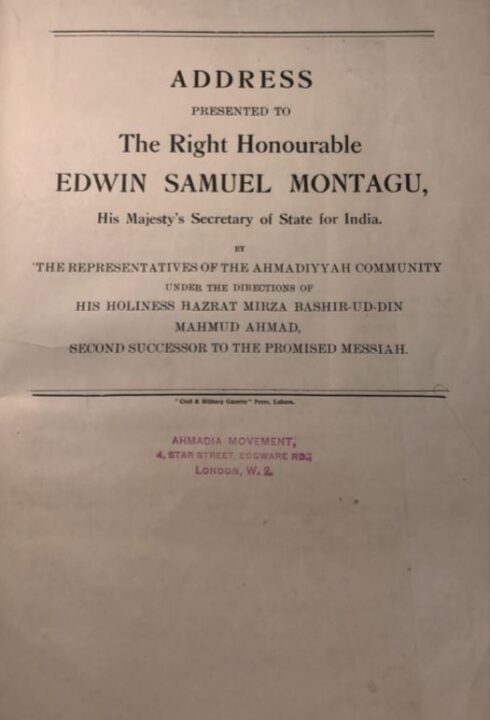
In 1917-1918, this office was held by Edwin Samuel Montagu and in those days, he came to visit India to assess the situation. On that occasion, Hazrat Musleh-e-Maudra presented an address to the secretary of state for India presenting clearly and in detail the suggestions to solve the problems faced in India. This address was presented to him in Lahore, which Hazrat Sir Zafarulla Khanra orally recounted to him. Huzoorra himself also had a meeting with Mr Montagu and explained the situation and guided him.
Mr Montagu noted about this meeting in his diary which was published after his demise as An Indian Diary. He noted under the date of 15 November 1917:
“Fourth delegation was Ahmadiyya delegation which is also a sect of Islam. They are Muslim; they believe in human equality and believe in all Prophets. A long document was read to me that was written by their ‘Huzoor’. This document was much better than all the other documents that were presented to us”.
He continues, ‘His document pertaining to the election of Members of the Executive Council and for Legislation, were better than those of other delegations and they had been prepared after a great deal of thought and with intelligence.’
It is important to give his concluding note in his own words:
“He has a good mind and had carefully thought out his constitutional scheme.”
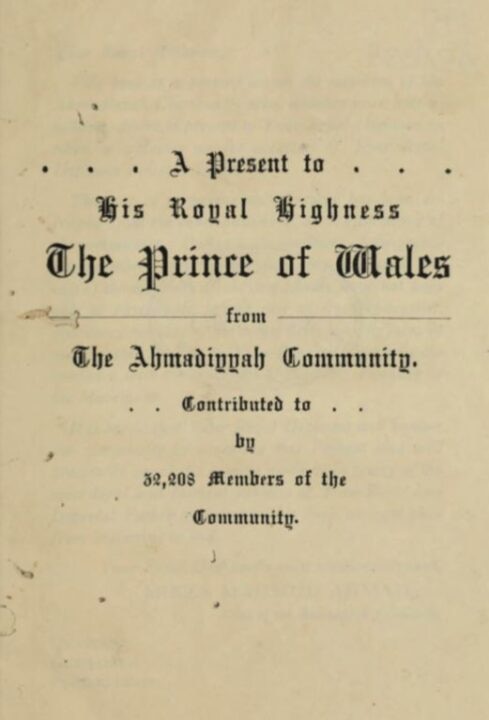
Similarly, from December 1921 to June 1922, Edward, Prince of Wales (Heir apparent to the crown) visited India. Wherever he went, whichever state he visited, he was showered with expensive gifts by the nobles and the heads. From priceless carpets to jewels and diamonds were presented to the Crown Prince to gain his good will and favour.
When he came to Lahore, Hazrat Musleh-e-Maudra also decided to give him a gift. After a great deal of thought, Huzoorra wrote a booklet in which he introduced the Crown Prince of the British Empire with Islam and the Ahmadiyya Community and invited him to the religion of Islam. The title of the booklet was A Present to His Royal Highness – The Prince of Wales.
A delegation of the Ahmadiyya Community presented the booklet to the Prince at Lahore. The secretary to the Prince wrote a reply to Huzoorra, a part of which is produced below:
“His Highness, the Prince has read the introduction to the Ahmadiyya Community in your address. His Highness desires to have more information on this subject.”
Wherever and whenever the question arose for the rights of Muslims, Hazrat Musleh-e-Maud’sra heart became most restless and this restlessness manifested itself as a magnificent guidance. When Hijaz and Najad were granted self-rule, the British Empire fixed stipends for the heads of the states to keep them under control. The British gave them arms and ammunition and loans to stabilise them and did whatever could be done to please those heads of states.
Hazrat Musleh-e-Maudra warned Lord Chelmsford that these actions would affect the independence of Hijaz and Najad. They would always remain under the obligation of the British. He also wrote to the heads of these states that the apparent courtesy of the British would always cost them dearly.
When Lord Reading became Viceroy of India, Huzoorra sent a delegation who read his address in the presence of the viceroy. The address contained condemnation of the agreement that compromised the independence of Hejaz and Najad. Such efforts on the part of Hazrat Musleh-e-Maudra have eternal testimony of his compassion and counselling for the rights of Muslim people and Muslim nations. If rulers of these states today look back to the decisions of their forebears, they may, perhaps, realise how far-sighted the advice was, and had it been accepted, they would not have been in the perpetual state of enslavement of the West.
The deep roots of compassion of Hazrat Musleh-e-Maudra for his own Jamaat were in fact the same as the compassion he had for the Muslim Ummah. While he so much loved the Muslim Ummah, how could it be that he would have less love for the Jamaat through which the revival of the true Islam was to take place?
That Jamaat was formed by the people, who sacrificed their wealth, their homes and their countries and accepted opposition to join the Jamaat of the Promised Messiahas. The betterment and welfare of these people was the most important mission of Hazrat Musleh-e-Maudra.
In this love, his heart was taller than a mountain and kept on smouldering like a volcano. When an opportunity came to introduce Islam in the conference of the Religions of the Empire held in England, Huzoorra himself mentioned that while he was writing his presentation, some nights, he did not sleep at all and often, he did not go to bed before one or two in the morning. The day was used up in this work and making travel arrangements. When the journey started, it was a two-month voyage by sea. Throughout the journey, Huzoorra suffered from flux and sea voyage also caused nausea and vomiting.
The reports sent from England during his stay show that his diarrhoea aggravated due to lack of rest. In one of his own letters, Huzoorra mentioned that he did not get time to even see some of London. In such a state of severe illness, this magnificent Musleh-e-Maud continued his efforts to spread the message of Islam.
This was but one example of the action of Hazrat Musleh-e-Maudra. However, to understand a personality, it is very important to see his reaction as well. The opponents were burning with jealousy. While burning in their own fire, they exceeded all limits and crossing all bounds, started riots and arson. The assault of the Ahrar was at its zenith.
In the name of religion, the processions of the Ahrar troublemakers were roaming the streets of Qadian, threatening that they would raze Qadian to the ground. If the Khalifa of Qadian had issued just one command, the Ahmadiyya population of Qadian would have dealt with these miscreants. But Hazrat Musleh-e-Maudra displayed great patience and asked his community to show patience as well. He himself prostrated to the Almighty Creator – He, Who had made promises of his birth, his upbringing and had promised the restoration of grandeur of Islam through him.
Hazrat Musleh-e-Maudra showed his reaction according to the directions that he received from the Almighty to counter the excesses and threats of the Ahrars. But just what was this reaction?
Hazrat Musleh-e-Maudra declared that the opponents could use all their schemes, they could do the worst that they could, they could spread fear and fright, but his God had given him a different command.
“As a reaction to all this disturbance, I want to announce a new scheme that God Almighty has disclosed to me; it is a scheme according to which each and every Ahmadi will donate all their spare income for the spread of Islam; it is a scheme according to which every Ahmadi should come forward and devote their life for the sake of God; every Ahmadi should devote their assets and property; a scheme according to which every Ahmadi promises to spend a simple life. In short, every Ahmadi should become an integral part of this scheme for the advancement of Islam.”
Hazrat Mahmudra called this scheme Tahrik-e-Jadid (The New Movement). Neither the behaviour of opponents changed, nor did Tahrik-e-Jadid, started by Hazrat Musleh-e-Maudra, slow down.
Indeed, during the times of later Khulafa, the scheme kept on growing and is still growing like an evergreen tree. Whatever auxiliary organisations and schemes that Hazrat Musleh-e-Maudra launched and activated are a testimony of his heartfelt concern for children, youth, old men and women of the Jamaat. He wanted to see them improving and he guided them to the path of progress, showed all of them their real destination and guided them.
The question arises as to what the expectations of Hazrat Musleh-e-Maudra were from us? Or what Khilafat-e-Ahmadiyya expects from us today?
The answer, in a nutshell, is in one couplet of Hazrat Musleh-e-Maudra:
ہے عمل میں کامیابی، موت میں ہے زندگی
جا لپٹ جا لہر سے، دریا کی کچھ پروا نہ کر
“Victory lies in action and life is in extinction; Go! Embrace the rapids and ignore the depth and flow.”
Indeed, Huzoorra followed the same principle all his life. When he was young, frail in health, with adverse social circumstances, without means, a migrant and in an inimical political environment, nothing could stand against his determination. He did not care about the depth or the violent flow of the river; he embraced the waves with prayers and determination and competing with death, he continued to triumph in his objectives. When he uttered the following couplet:
پیٹھ میدانِ وغا میں نہ دکھائے کوئی
منہ پہ یا عشق کا پھر نام نہ لائے کوئی
“Turn not your back in the battleground of loyalty, or never ever utter the words of love and fidelity.”
This reminds us of the promise that he made in 1908 to the Promised Messiahas. Standing at the head of the bed, the corpse was in front of him, the house was bereft of all worldly good and outside, the opponents were creating riot. In such a scenario, his pledge became a practical image of the above couplet. This is what is also expected from us. Either do not give this pledge or, if you have given a pledge of loyalty, you will have to fulfil this to the end of your life. This is the very foundation of a community as he said:
میں اپنے پیاروں کی نسبت ہرگز نہ کروں گا پسند کبھی
وہ چھوٹے درجہ پہ راضی ہوں اور ان کی نگاہ رہے نیچی
“For my beloveds I shall never feel satisfied; If they have low ambitions or downcast eyes.”
He demonstrated this resolve in his lifetime. A man living in a small town of Qadian, starts a newspaper by the name of Al Fazl and with his vision, elevates it to such high standards that the political fraternity of India, be it Hindu, Muslim or the British government, waited impatiently for this newspaper to see what Mirza Bashiruddin Mahmud Ahmadra had to say about the latest social and political issues.
Well-known editors of Urdu newspapers, that had started with large capital and were published in many cities of India simultaneously, were awe-struck to see the wondrous take-off of this newspaper.
We see that Huzoorra never lowered his aims, nor did he allow the circumstances to interfere in his lofty aspirations. His also expects us to have the same resolve and high ambitions, whatever the circumstances are. He instructed all Jamaat members to gain knowledge and skills of all sorts. He provided the means to gain education.
He started schools and colleges and instituted scholarships for deserving students so that no one was deprived of the opportunity. Although he appreciated the scholarship and knowledge, he also cautioned:
تم مدبر ہو کہ جرنیل ہو یا عالم ہو
ہم نہ خوش ہوں گے کبھی تم میں گر اسلام نہ ہو
“A general, a diplomat, a savant you may be; no delight it is to me if no Islam in thee.”
Addressing all of us, he emphasised:
عسر ہو یسر ہو تنگی ہو کہ آسائش ہو
کچھ بھی ہو بند مگر دعوتِ اسلام نہ ہو
“Affluence or indigence, meagreness or profusion; invite to Islam must go on whatever the condition.”
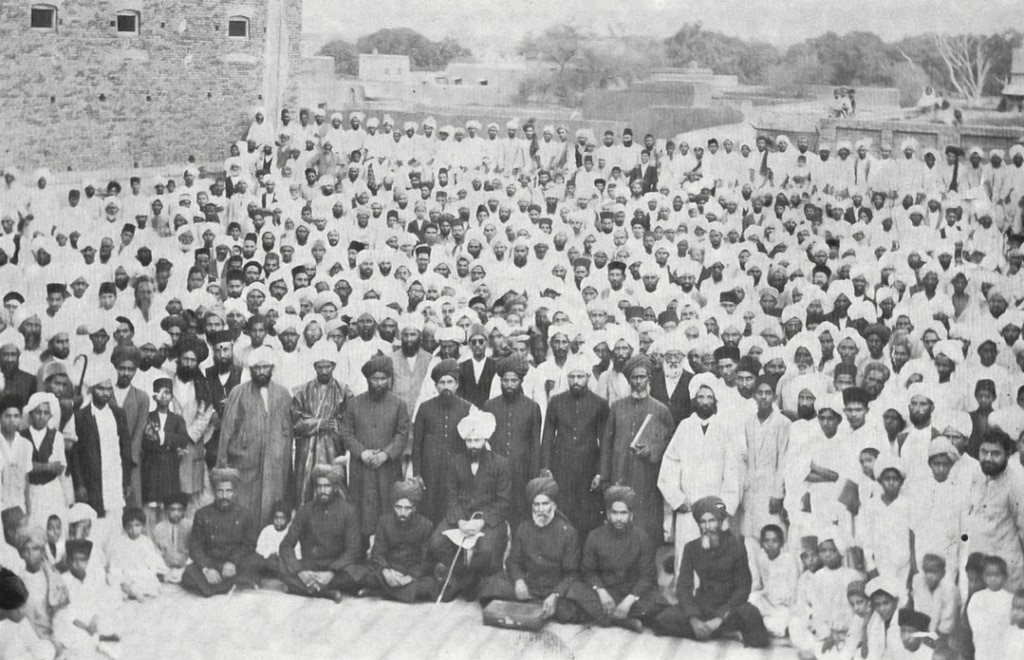
He left behind magnificent practical examples for us. In 1924, neither circumstances, nor health was suitable to undertake a sea-voyage to London; but it was an opportunity to give the message of Islam. The treasury of Anjuman-e-Ahmadiyya could not bear the burden of this journey. Huzoorra borrowed the money from a devoted and generous friend from Deccan to commence this arduous journey. The sweet rewards of this journey are evident even today – a journey that was undertaken without any regard to the circumstances of poverty or richness or personal health.
The mind is running out of superlatives and ink in the pen has run dry. Perforce, I have to end this article. I conclude it with a couplet that encapsulates all hopes and expectations that Hazrat Musleh-e-Maudra had from his precious Jamaat.
میرے پیارے دوستو، تم دم نہ لینا جب تلک
ساری دنیا میں نہ لہرائے لوائے قادیاں
“My dear friends, persevere till comes the time; in all corners of the world, flies the Qadian ensign.”
(Translated by Saleem Ahmad Malik, UK. Originally published in Al Fazl International, London; 20 February 2020)


Masha’allah
Greetings! Very useful advice within this article!
It’s the little changes that will make the most important changes.
Thanks for sharing!